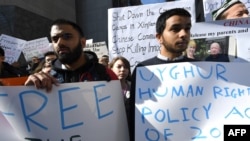President Donald Trump held off on imposing tougher sanctions on Chinese officials blamed for a crackdown on China’s Uighur Muslim minority because of concern such measures would have interfered with trade negotiations with Beijing, he said in an interview published on Sunday.
"Well, we were in the middle of a major trade deal. And I made a great deal, $250 billion potentially worth of purchases,” Trump was quoted as telling Axios Friday when asked why he had not enacted Treasury sanctions against Communist Party officials linked to repression in the Xinjiang region.
The United Nations estimates that more than a million Muslims have been detained in camps there. The State Department has accused China of subjecting Muslims to torture and abuse.
China has denied mistreatment and says the camps provide vocational training and help fight extremism.
U.S. officials previously told Reuters that since late 2018 they had weighed sanctions against Chinese officials over Xinjiang but refrained because of trade and diplomatic considerations.
Under a Phase 1 trade deal negotiated in 2019 that took effect in February, China agreed to buy at least $200 billion in additional U.S. goods and services over two years.
Former national security adviser John Bolton alleges in a new book that Trump sought Chinese President Xi Jinping's help to win reelection during a 2019 meeting by making agricultural purchases, and Trump also encouraged Xi to go ahead with building camps in Xinjiang. Trump has denied the accusations. The United States since last year has placed import restrictions on some Chinese companies and visa bans on unnamed Chinese officials linked to Xinjiang but has not imposed harsher Treasury sanctions.
Trump signed legislation last Wednesday calling for sanctions over Xinjiang, drawing threats of retaliation from China. He insisted, however, he had discretion to decide any application of the measures.
Elsewhere in the interview, Trump said he would consider meeting Venezuelan President Nicolas Maduro and also suggested he has had second thoughts about his decision to recognize opposition leader Juan Guaido as the country's legitimate leader.
"I would maybe think about that. ... Maduro would like to meet. And I'm never opposed to meetings," Trump told online news site Axios on Friday, a move that would upend his "maximum pressure" campaign aimed at ousting the Socialist president. He added, however, "but at this moment, I've turned them down."





